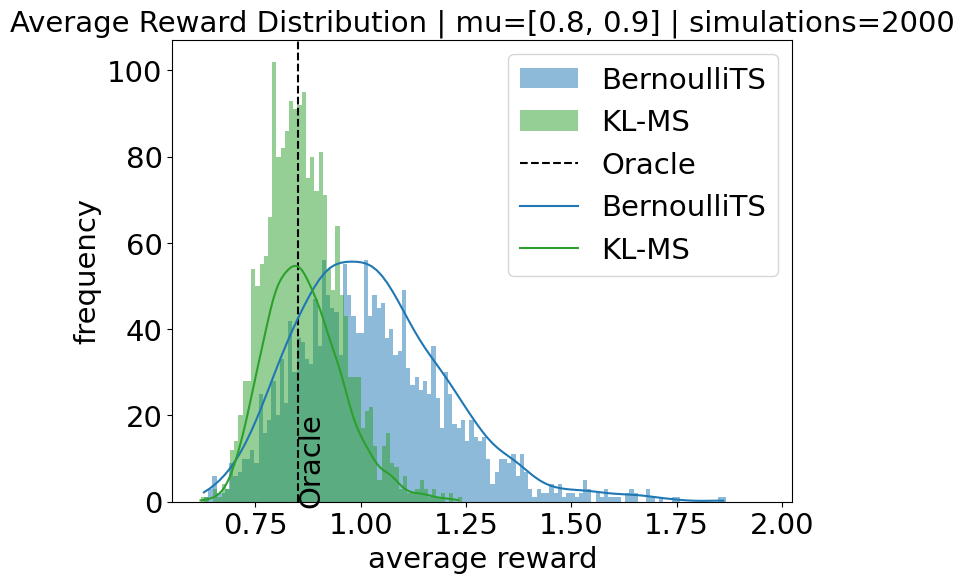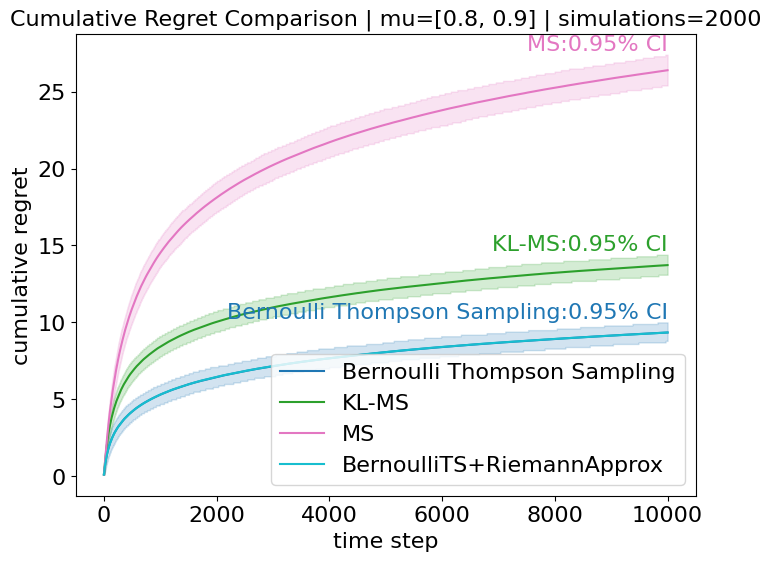This official repository contains the implementation of the algorithms discussed in the paper Kullback-Leibler Maillard Sampling for Multi-armed Bandits with Bounded Rewards. The paper introduces a novel approach to solving the multi-armed bandit problem using Kullback-Leibler divergence following the Maillard Sampling rule to achieve a highly efficient bandit algorithm.
We study K-armed bandit problems where the reward distributions of the arms are all supported on the
To run the code, ensure you have Python installed. You can clone this repository and install the necessary dependencies using:
git clone https://github.com/MjolnirT/Kullback-Leibler-Maillard-Sampling
cd Kullback-Leibler-Maillard-Sampling
pip install -r requirements.txtThe experiment consists of two main steps:
-
Run Simulation in a Bandit Environment: In this step, the main simulation is executed using the configuration file generated in the previous step. This simulation will run the KL-MS algorithm in a predefined bandit environment, allowing you to observe its performance.
python running_simulations.py <path-to-config>
-
Run Offline Evaluation: After the simulation, an offline evaluation is conducted to analyze the results. This step helps in assessing the performance of the KL-MS algorithm by comparing it with other traditional bandit algorithms.
python evaluation.py <path-to-config>
-
(Option) Generating figures using obtained simulation and evaluation results: Although we have already obtained desired cumulative and average regret plots by executing the above two steps, we can utilize obtained data to generate those plots without re-running the whole experiments.
# navigate to the source folder cd Kullback-Leibler-Maillard-Sampling # generating simulation plots python -m src.utility_functions.generate_plots <path-to-config> # generating offline evaluation plots python -m src.utility_functions.generate_eval_plots <path-to-config>
To generate Figure 1 in the main body of paper (Page 2), we should choose figure file figure1_main.json in the folder config and run following commands:
cd Kullback-Leibler-Maillard-Sampling
python running_simulations.py ./config/figure1_main.json
python evaluation.py ./config/figure1_main.jsonAfter running the simulation and offline evaluation, you should obtain a data folder and a figures folder. The desired plot should be in the figures folder, named eval_reward_hist.png. The data folder contains all simulation results and evaluation results.
The results of our experiments demonstrate the effectiveness of the KL-MS algorithm in environments with bounded rewards. The algorithm achieves performance comparable to the best traditional bandit algorithms, while maintaining an unbiased estimation during offline evaluation. The following figures illustrate the estimated policy performance and cumulative regret:
The histogram above shows the estimated policy performance from the offline evaluation, indicating that KL-MS provides unbiased estimates as well as lower variance.
The plot above depicts the cumulative regret with a confidence interval, highlighting the algorithm's efficiency in minimizing regret over time compared to MS and MS+.
To create a self-defined experiment, you can use the generate_config.py script to create configuration files tailored to your specific needs. This script allows you to define the parameters for the bandit environment and the algorithms you want to test directly within the script.
-
Generate Configuration File: Modify the
generate_config.pyscript to set your desired parameters. The script includes variables for the number of simulations, the reward distribution, the algorithms to be used, and their respective parameters. Once configured, run the script to generate the configuration file. We assume reward distributions are Bernoulli and we only use their means to define reward distribution.Explanation of Parameters:
TEST_CASE: Determines the reward distribution. Set to1for[0.2, 0.25]or2for[0.8, 0.9].ENV_REWARD: Reward distribution for the bandit environment, automatically set based onTEST_CASE.N_SIMULATIONS: Number of simulations to run. Default is 2000.T_TIMESPAN: Time horizon length for each simulation. Default is 10000.INCLUDED_ALG: List of algorithms to be tested. Options includeBernoulliTS,KL-MS,KL-MS+JefferysPrior,MS,MS+, andsimuBernoulliTS.MC_SIMULATION_ROUND: Number of Monte Carlo simulation rounds forBernoulliTS.VARIANCE: Variance parameter forMSandMS+.
After setting these parameters, run the script:
python generate_config.py
-
Run Simulation in a Bandit Environment: Once you have generated the configuration file, you can run the main simulation using the
running_simulations.pyscript.python running_simulations.py <path-to-config>
-
Run Offline Evaluation: After the simulation, use the
evaluation.pyscript to conduct an offline evaluation and analyze the results.python evaluation.py <path-to-config>
By following these steps, you can create and run your own experiments to test different algorithms in a bandit environment. Make sure to review the generated configuration file to ensure it meets your experimental requirements.
If you use this code or the ideas presented in the paper, please cite:
@article{qin2024kullback,
title={Kullback-leibler maillard sampling for multi-armed bandits with bounded rewards},
author={Qin, Hao and Jun, Kwang-Sung and Zhang, Chicheng},
journal={Advances in Neural Information Processing Systems},
volume={36},
year={2024}
}
This project is licensed under the MIT License - see the LICENSE file for details.

